Russell Ebert state funeral: Port Adelaide legend to be honoured at Alberton Oval on Tuesday
The time and date of Russell Ebert’s state funeral has been confirmed. Find out when the Port Adelaide legend will be farewelled and how you can attend.
Port Adelaide
Don't miss out on the headlines from Port Adelaide. Followed categories will be added to My News.
A time and date for a state funeral for Port Adelaide legend Russell Ebert has been locked in.
The state government has announced a farewell to Ebert, arguably Port’s greatest player and one of South Australia’s best, will be held at Alberton Oval on Tuesday at 11am.
Ebert passed away on Friday aged 72 after an 11-month battle with leukaemia.
Premier Steven Marshall offered a state funeral to Ebert’s family, which was accepted.
Capacity will be capped at 7000 to attend the service, with 2000 people already claiming spots on Wednesday evening.
Mr Marshall said it would celebrate his football achievements as well as his decades of work in the local community leading social causes.
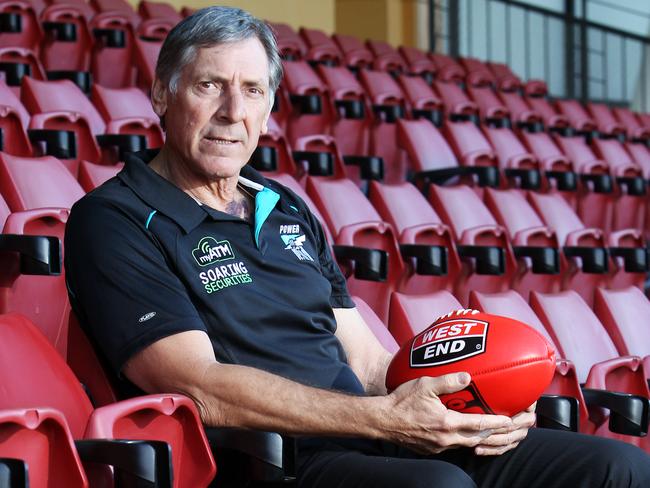
“Russell’s remarkable achievements both on and off the field are well-documented, and the outpouring of tributes in recent days is testament to the impact he has had on so many lives,” he said.
“As well as being the only person in SANFL history with four Magarey Medals, coupled with multiple premierships and a brilliant career as a coach, he was also a champion for combatting domestic violence and supporting children with serious illnesses.
“His beloved Port Adelaide Football Club, along with all South Australians, mourn the loss of this legendary player and person, and it is fitting that we honour his life with a State Funeral.”
In lieu of floral tributes Ebert’s family has requested donations be made to the Australian Red Cross or the Leukaemia Foundation.
To attend in person, register via https://russellebert.eventbrite.com.au. The funeral will also be livestreamed for those unable to attend. Visit the DPC website to view the event live.
Port Adelaide chief executive Matthew Richardson said it was a most fitting honour to farewell Ebert with a State Funeral.
“Russell transcended football loyalties in this State. He was respected and admired by all and his contribution and impact extended well beyond Port Adelaide. Russell gave so much to the broader community of South Australia and I’m sure South Australians from far and wide will want an opportunity to farewell him,” he said.
“On behalf of the Ebert family, we thank Premier Marshall and the State Government for this significant gesture.
“Alberton always had a special place in Russell’s heart and was where he created so many wonderful memories across his remarkable career. It was Russell’s wish that he be farewelled at Alberton, his home since leaving the Riverland as an eighteen year-old.”
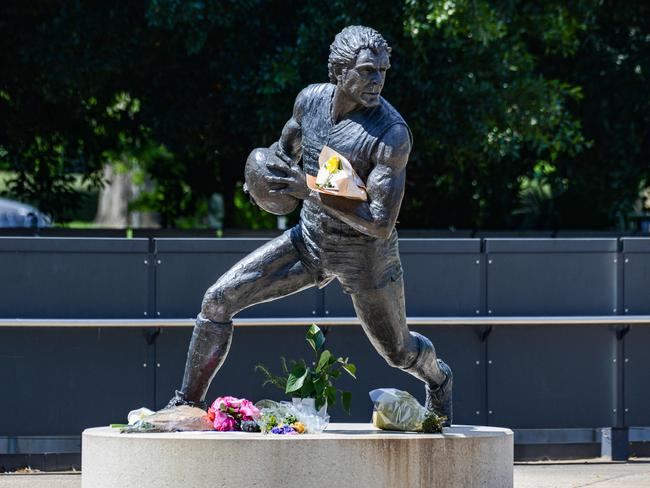
Ultimate honour: State grants Ebert fitting farewell
Port Adelaide legend Russell Ebert will be honoured with a state funeral next week.
Four days after Ebert’s death, aged 72, Premier Steven Marshall announced on Tuesday that the four-time Magarey Medallist would be farewelled at a service at Alberton Oval.
Marshall offered a state funeral to Ebert’s family after the football champion lost his 11-month battle with leukaemia on Friday.
The family accepted, ensuring the community would be able to pay their respects to Ebert at Port Adelaide’s home ground.
Marshall said the family was yet to determine what day the funeral would be held, but it was unlikely to be Monday.
“Russell Ebert made an extraordinary contribution to South Australia as a football player ... but also (an) extraordinary contribution to the community sector across many worthy causes,” Marshall said.
Ebert is considered Port Adelaide’s greatest player and is the club’s games record holder with 392.
The Riverland product also lined up in 29 games for South Australia, including captaining the state, and featured in 25 matches for North Melbourne in 1979.
Ebert is survived by his wife Di, as well as children Ben, Brett and Tammie.
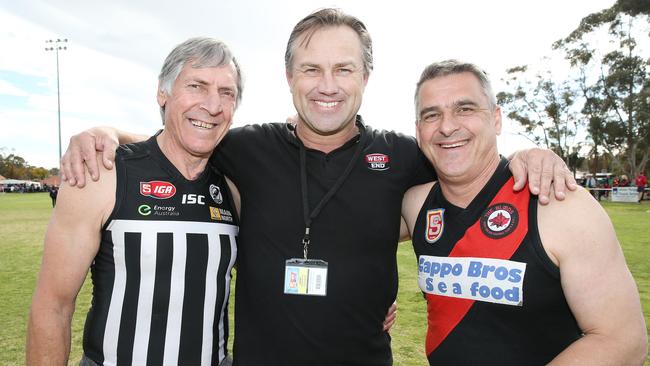
‘Ebert country’: Tributes to Port legend
- Simeon Thomas-Wilson
Riverland councils will consider ways to celebrate the life and achievements of one of the region’s greatest exports – Port Adelaide legend Russell Ebert.
Ebert, not only regarded as Port Adelaide’s greatest player but also one of SA’s best footballers, passed away on Friday aged 72 after an 11-month battle with leukaemia.
Ebert’s incredible career at Port Adelaide – he is the only four-time Magarey medallist and three-time premiership player with the Magpies – began when he debuted as an 18-year-old in 1968 after arriving at Alberton from the Riverland.
Ebert was born in Berri, but played his junior footy with Loxton and then Waikerie before he joined the Magpies.
The mayor of Berri Barmera Peter Hunt said Ebert was revered across the region.
“It didn’t make any difference where you came from in the Riverland, you always revered Russell,” he said.
“And for all of the greats that have come out of the Riverland, he was really one of the first to establish the Riverland’s name as a place for some good footballers to come from.”
SA Premier Steven Marshall has offered the Ebert family a state funeral or memorial, with Port Adelaide chief executive Matthew Richardson to sit down with the government in the coming days to decide the next steps.
Mayor Hunt said his council hadn’t formally discussed a way to celebrate the life of Ebert, but there could be the potential for the whole Riverland community to be involved.
“He was a Riverlander, so maybe we should be doing something across Riverland councils or the Riverland community for Russell because he certainly put the Riverland on the map as far as football goes,” he said.
“And his story after football is synonymous around the place as well.”
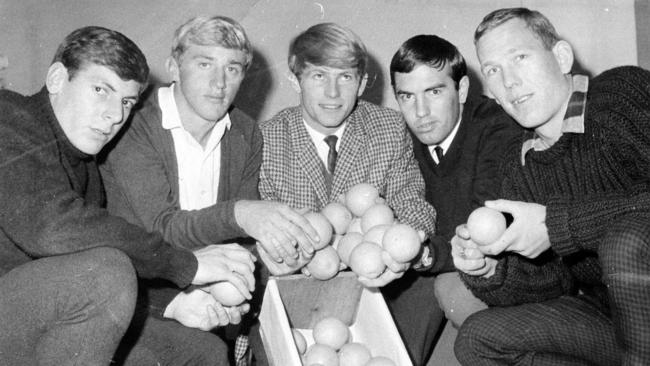
Loxton Waikerie mayor Leon Stasinowsky said Ebert always held a deep love for the area.
“What we will do to mark his death I don’t know yet,” he said.
“He was certainly an outstanding athlete, but also an outstanding person in the community because he always came back to the Riverland and Loxton and he always called it home.”
Not only was he a legendary footballer for Port Adelaide, but Ebert also had a significant influence off the field.
He created the Power’s community youth programs and worked in that area of the club until his leukaemia diagnosis last December.
How Port Adelaide intends to honour legend
– Matt Turner
Port Adelaide is looking at ways to incorporate Russell Ebert and his legacy into its Alberton Oval precinct.
Ebert – who died on Friday, aged 72 – already has the western gate named for him at Alberton, but Port Adelaide will seek to further honour the four-time Magarey Medallist, along with other club greats, in its planned $30m redevelopment of its home ground.
Considered to be among SA’s best footballers, Ebert is almost unanimously regarded as Port Adelaide’s greatest player and is its games record holder.
He also had a significant influence off the field, creating the Power’s community youth programs and working in that area of the club until his leukaemia diagnosis last December.

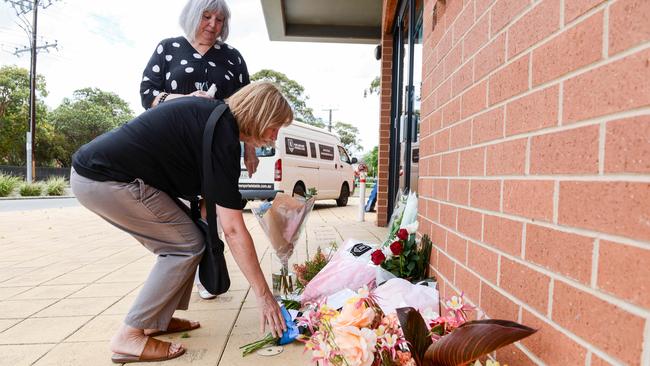
Port Adelaide chief executive Matthew Richardson said the club had not formally discussed how it would honour Ebert.
“We’ve got a really exciting development planned here at Alberton Oval, the whole precinct, and part of that will be finding ways to recognise the legends of our club,” Richardson said.
“Russell will absolutely be on that list.”
Ebert is one of four footballers honoured with statues in their likeness outside Adelaide Oval, along with Barrie Robran, Ken Farmer and Malcolm Blight.
A tribute to the great Russell Ebert, vale. My cartoon in the Sunday Mail tomorrow #pafc#Russellebert@theTiserpic.twitter.com/Kz1BDd5aTZ
— Peter MacMullin (@PeterMacMullin) November 6, 2021
About a dozen bunches of flowers had been left at Ebert’s bronze sculpture, near the east gate, off King William St, by Saturday afternoon.
Tributes were also placed outside the Power’s Alberton Oval headquarters, starting on Friday evening, shortly after news spread about Ebert’s passing.
Richardson said Ebert, who won three premierships and a club record six best and fairests, was peerless as a Port Adelaide player.
But Richardson described the Riverland product’s enduring legacy as being able to use football to change and influence people’s lives.
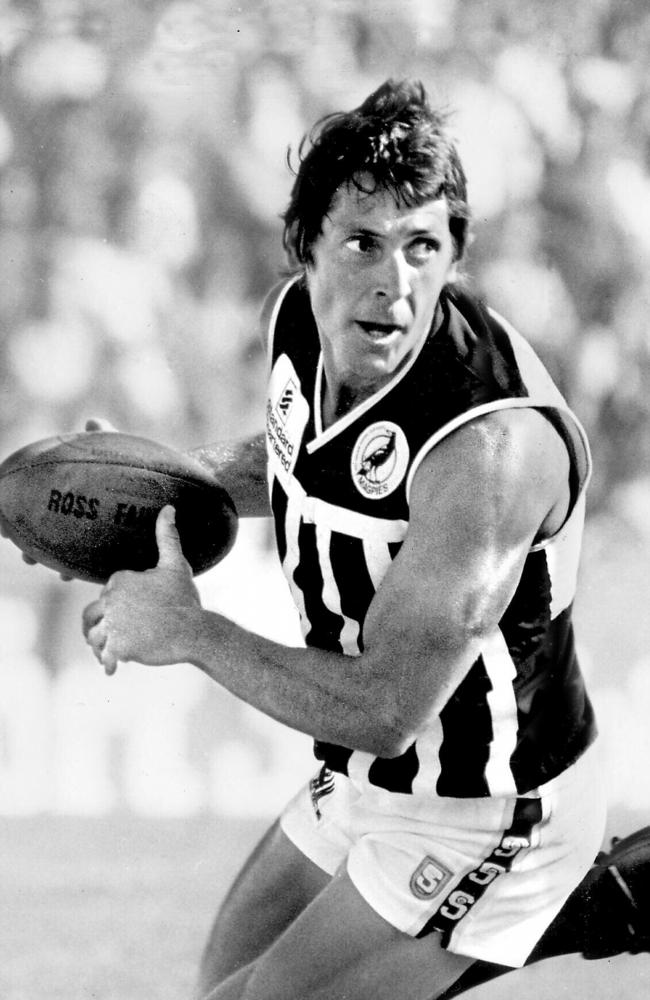
As well as helping to establish the club’s community youth programs in 1999, Ebert dedicated himself to various charities, including disability services organisation Novita.
“I think that is probably the thing that elevates Russell above any – the ongoing impact he has had and will continue to have on the community,” Richardson said.
“That is our great responsibility now as the custodians of the club, to continue the work that he laid the foundations for.”
Ebert helped to educate children in schools and the younger Power players who went with him on visits.
Richardson said although his friend did not mince his words, he would do anything for anyone.
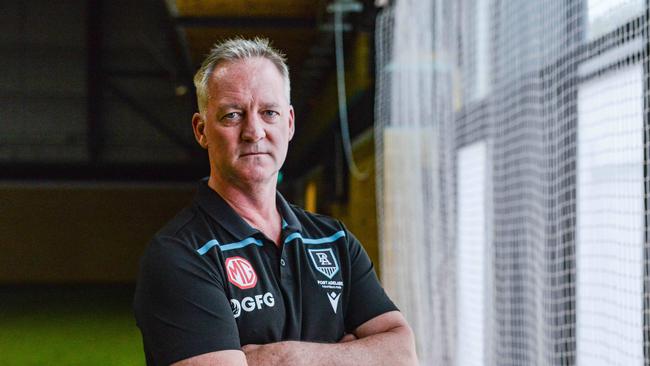
“I remember when we played in Shanghai in 2017, he came with us, it was 35C and he was putting seat cushions on each of the seats, and did that all day,” he said.
“You had to stop yourself and think ‘that’s Russell Ebert’.
“When new staff came into the organisation and we introduced them to Russell Ebert, he was always asking how people were, he always had time for them.
“It was never about Russell, it was always about helping other people.
“He talked often about his gratitude for what the football club or the supporters or the community had done for him and his family.
“He was an incredible man.”
Richardson became close with Ebert during their two decades working together.
Even after Ebert’s deteriorating health forced him to step away from his role, he would regularly check in with Richardson to ask how he was and what was happening at the club.
Richardson was at Alberton on Friday afternoon when Ebert’s son, Brett – a 166-game Power player and winner of the 2003 Magarey Medal for the Magpies – called with the news.
“I’d spoken to Russ most weeks,” Richardson said.
“He gave me a call Monday morning and he sounded really good, the best he had for a while.
“So when Brett rang me yesterday afternoon, it was a bit of a shock, like it was for a lot of people.”
The news also hit lifelong Port Adelaide supporter Meredith Lee hard.
“We were expecting it at some stage but … I was quite emotional,” Lee told The Advertiser.
“There were some tears last night, then again this morning.”
Lee headed to Alberton on Saturday with friend and fellow Port Adelaide fan Jan Macdonald to leave flowers, a card and a Power rosette.
“It just seemed like an appropriate thing to do,” Lee, aged in her 60s, said.
“Alberton is a Mecca to us and we wanted to go show our respects.”
Macdonald added: “Our hearts go out to the Ebert family”.
Lee said Ebert was a champion who transcended team rivalries.
On Saturday, she spotted a North Adelaide supporter having a beer in Port Adelaide’s clubrooms, wearing a black armband.
Lee said Ebert should have something else at Alberton, apart from the western gate, named in his honour.
“He wasn’t a one-man team – they were all our heroes – but with his record and the sort of person he became after (retiring from) the club, there should be something,” she said.
“He’s up there with the Bob Quinns and Fos Williams’s – when you talk about those people, you have to talk about him in the same breath.
“I randomly said the Allan Scott Headquarters should be renamed.”
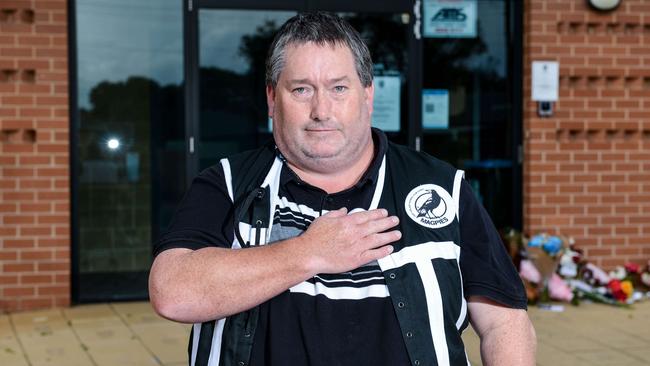
Long-time Port Adelaide fan Mathew Smith said it was unfortunate the oval’s traditional scoreboard had been demolished because it would have been nice to see an ‘Ebert, rest in peace’ tribute on there.
He suggested a new scoreboard should be installed and named after the Port Adelaide great.
Wearing a prison-bar guernsey, Smith laid flowers at the club on Saturday while pointing to the Magpies emblem on his jumper.
Among the tributes at Alberton was a card that included the line: “What would you do if God arrived on earth? Move Russell to the wing.”
Richardson later spoke to the media inside the Power’s headquarters as the heavens opened.
“Russell Ebert was god at Port Adelaide, he’s obviously just arrived and there’s a bit of a commotion upstairs,” he said.
That was Richardson’s quick-witted opening line before saying: “When I think of Russell I think of three incredible legacies: family, football and community”.
“Above everything else Russell was proud of his family, his beautiful wife Di, (children) Tammie, Ben, Brett … and wonderful grandkids – he would light up when he talked about his grandkids – and also his siblings,” he said.
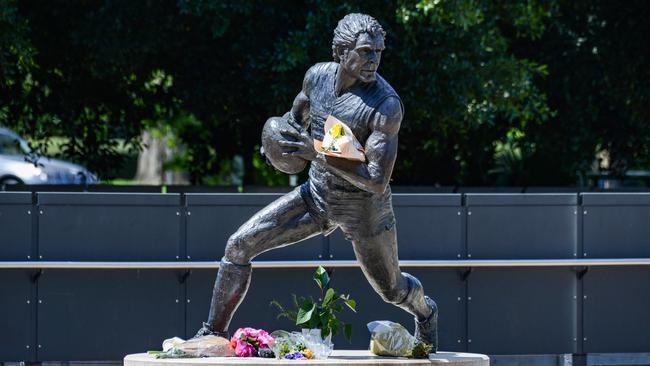
Premier Steven Marshall has offered the family a state funeral or memorial and Richardson plans to sit down with them in coming days to decide the next steps.
“There’s a lot of people that will want to pay their respects and acknowledge Russell for how he’s helped them,” Richardson said.
“That’s not just the Port Adelaide Football Club, but the South Australian community.
“We’ll do what’s best for the family.”
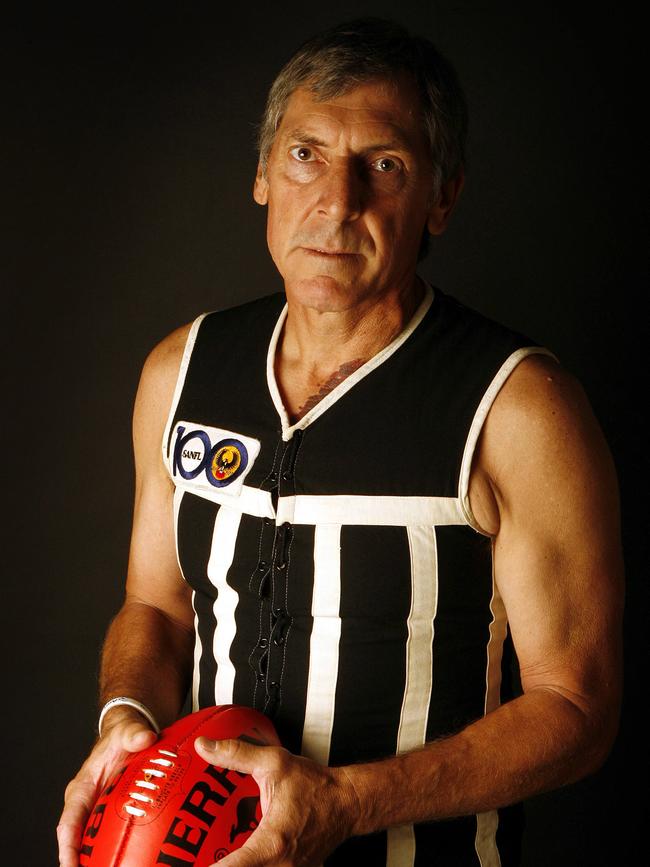
Marshall, a Port Adelaide supporter and former Ethelton Primary student, said he wore Ebert’s No. 7 on his duffel coat growing up.
“He was larger than life at the club when I was a little kid, but I got to know him later in life and what I saw there was a champion off the field,” Marshall told FIVEaa.
“He cared about his fellow man and would do anything for anybody and didn’t need any praise for it, in fact he was a humble man and a gentleman.
“We’ve lost one of our greatest sons here in South Australia.”
Last month the SA Sport Hall of Fame elevated Ebert as its seventh legend – fitting considering he wore No. 7 for much of his career.
Ebert is also a member of the SA and Australian football halls of fame, but does not hold legend status in the national honour roll.
Richardson expected that to change.
“From the Port Adelaide Football Club’s point of view, Russell Ebert is already a legend of Australian football,” he said.
“I’m sure at the right time that acknowledgment will come from the Australian Football Hall of Fame as well.”
The incredible story of a Port legend
On-field legend, off-field champion, Port Adelaide royalty.
Russell Ebert began making his mark in SA football when he debuted for the Magpies as an 18-year-old in 1968, after arriving at Alberton from the Riverland.
Last year he was still at Port Adelaide — working in the club’s community programs.
In between, Ebert, who died on Friday, aged 72, after an 11-month battle with acute myeloid leukaemia, made a massive contribution as a player, coach and in the community.
Widely regarded as one of South Australia’s finest footballers, Ebert is the only four-time Magarey medallist and Port Adelaide’s games record holder with 392.
The SA and Australian football hall of fame member was also a six-time best and fairest, three-time premiership winner, one-time flag-winning captain, former state skipper and claimed the inaugural Jack Oatey Medal.
When The Advertiser formed a seven-person panel last year to determine Port Adelaide’s greatest player for the club’s 150th season, Ebert was a unanimous No.1.
Last month the SA Sport Hall of Fame elevated him to legend status, becoming just the seventh person to receive the honour.
Former Magpies captain and teammate Tim Ginever told News Corp Ebert inspired generations of footballers and fans.
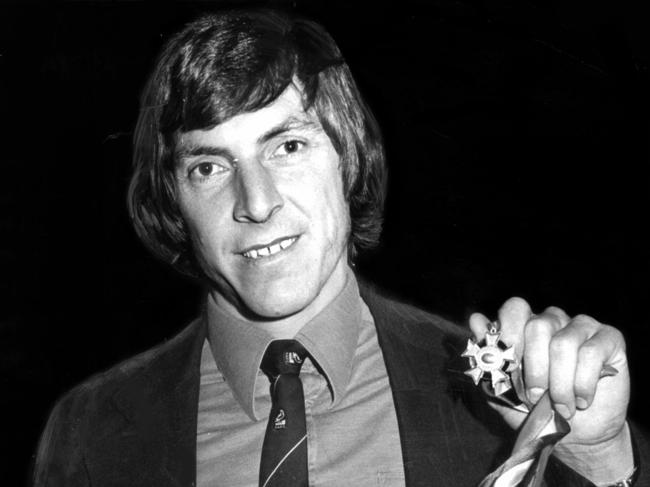
“They (Port Adelaide supporters) used to call him god but he was like an incredible icon for us,” said Ginever, who lined up in 313 games from 1983-97 then later worked with Ebert at Alberton.
“Growing up, it was like meeting John Lennon or Mick Jagger, or someone like that.
“We used to play in the schoolyard making out like we were Russell Ebert, doing that fancy handball.
“Our 1988-99 era that won nine flags out of 12, we all grew up admiring Russell Ebert – he was the benchmark: ‘How do you get to be like Russell?’
“We knew he was battling but unfortunately when the news comes, it just hits you like a brick in the face.”
Ebert was born in Berri in 1949 and played for Loxton and Waikerie, before debuting for the Magpies.
He quickly established himself as a star, winning his first Magarey and best and fairest in his fourth season.
Sublimely skilled, Ebert regularly produced pinpoint passes, one-handed pick-ups, soaring marks and his trademark long handball.
Defensive qualities like tackling and chasing, which some superstars would avoid, were also part of his game.
In 1974, he became Port captain and added his second Magarey and third best and fairest. Over the next two years he was awarded the state captaincy and claimed his third Magarey. Ebert’s determination for success and team-first approach was finally rewarded when, after playing in losing grand finals in 1968, 1971, 1972 and 1976, he skippered Port to a drought-breaking flag in 1977, which earlier this year he called a career highlight.
Ginever said Ebert was almost the perfect model if you were creating an ideal footballer.
“You hear about big midfielders these days, Russell was that,” he said.
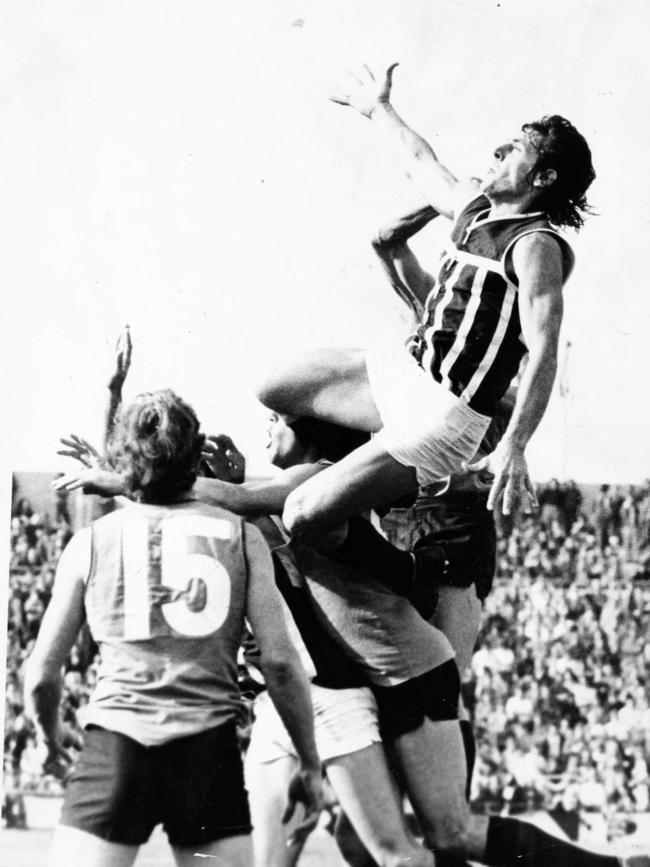
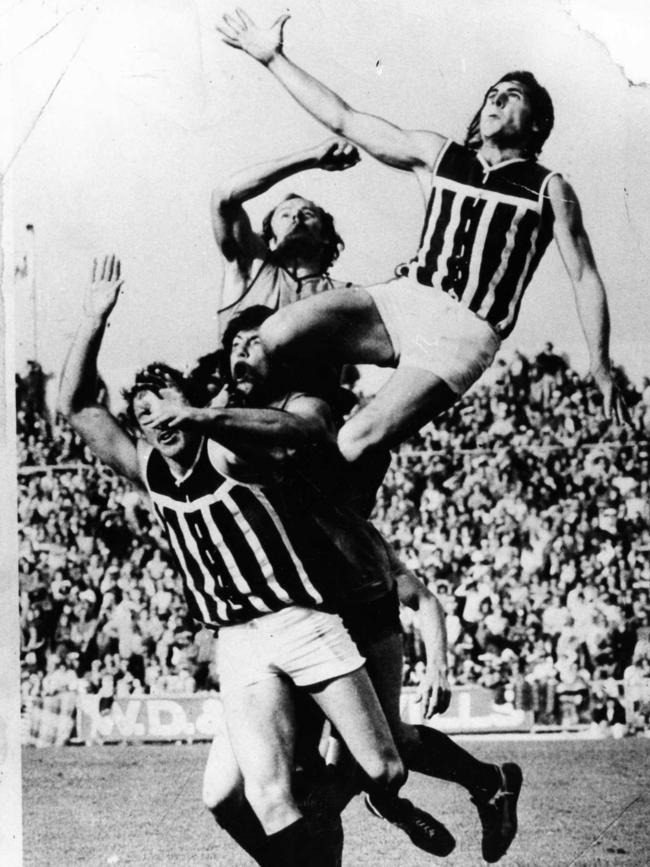
“I know he’s of German design with the name and my god he was like a tank.
“He could play centre halfback, he started at full-forward, he was a star in the centre.
“He was powerful, he was fast, he was balanced, left (foot), right, both hands, pick the ball up beautifully, clean, one take – everything you want in a footballer.”
Another former Magpies captain and teammate, Brian Cunningham, said Ebert was a gifted player who worked incredibly hard in his preparation.
“If he got a corkie for example, he’d stay up all night and ice it – most of us would do the icing, snooze and then do the eight hours in, but he’d stay up icing it so he could play next week,” Cunningham told News Corp.
“The talent he had was fantastic but it was ultimately the work he did around that which made him the best that he could be and ultimately the best ever.”
Ginever told a similar anecdote.
“One night I went around his place for a card night and there was (Magpies players) Tim Evans, Stephen Curtis, ‘Bomber’ (Stephen Clifford) and a few blokes like that … and Russ had an ice pack on his injured corkie,” he said.
“He just sat there playing and would change it every 20 minutes and redo it and redo it.
“He was probably 35 at the time and his preparation to make sure he was right was exceptional – he set that tone of professionalism for the club.”
As significant as Ebert’s football contributions were, the ones he made after hanging up the boots rivalled them.
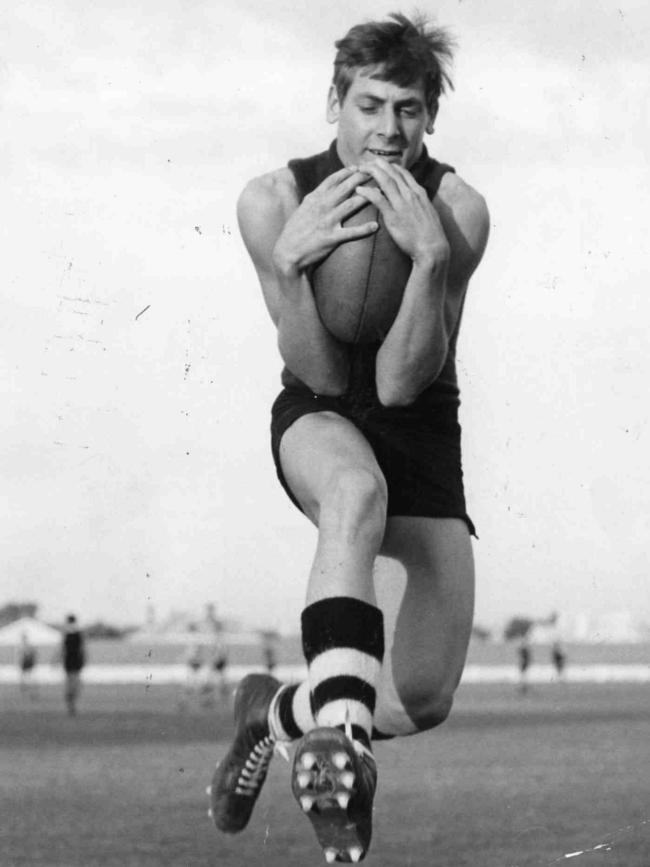
He was instrumental in supporting disability services organisation Novita and the Power to End Violence Against Women youth program, as well as helping grow Port Adelaide’s community arm.
In October last year, he received the 2021 South Australian Local Hero Award, recognising his off-field work at Port Adelaide.
Like he always would when praised about his football achievements, a humble Ebert deflected attention to the club as a whole and the team around him.
It was Ebert who had the idea of the club running school programs more than 20 years ago and he returned as its liaison manager.
Although his health stopped him from working at the club last year, he continued to speak regularly to colleagues such as Port Adelaide chief executive Matthew Richardson.
“As football clubs we used to go in cheerful, have a few kicks with the kids and then rattle back to your destination,” Ginever said.
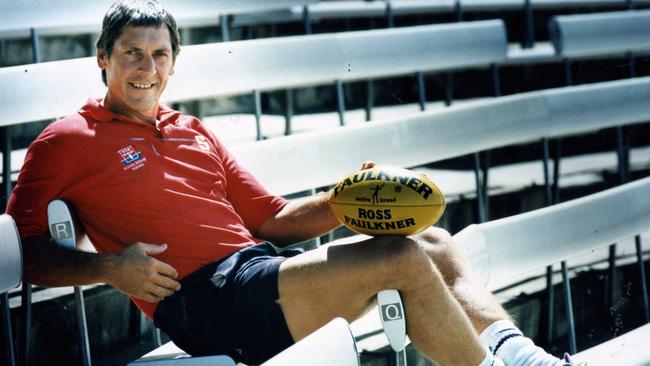
“Russell was always of the opinion we had to do more about getting the kids educated.
“He wanted to give them good decisions in life like eat healthy.
“It went on for 22 years and is still going strong in the community because of his ideal that you want to get them young because that’s when you have that biggest influence.
“He had a great influence on the youth right until the day he’s passed.”
Cunningham said Ebert had three phases at Port Adelaide.
“The first was as the young buck from the country, then when he was the best player in SA with (North Adelaide’s) Barrie Robran, and people couldn’t split the two of them, and from a Port Adelaide point of view, we had some fantastic success,” Cunningham told News Corp.
“Then at the end of his career he started a new career and gave so much back to people and the community.
“He made a really conscious decision he was going to give back as much as he could.
“He was there for 20-odd years (in his off-field role) giving back to all facets of the footy club and the community.
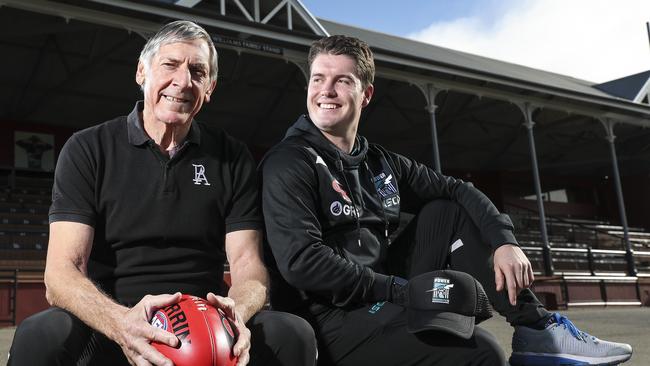
“Then you think of all the charities and people on the street he’s been there for, it’s quite staggering what he’s done.
“From a Port Adelaide point of view, has anyone ever given more to a football club than he has?
“He made all of us proud.”
Ebert captained the Magpies from 1974-78, won his next two flags in 1980 and 1981 and snared the SANFL’s first Jack Oatey Medal after the latter triumph.
He also spent a season in the VFL, kicking 15 goals from 25 games with North Melbourne in 1979.
Ebert was Port Adelaide’s captain-coach for three years, steering the club to the 1984 grand final, then its non-playing mentor for two more, and later coached Woodville.
His brother, Craig, also played for the Magpies.
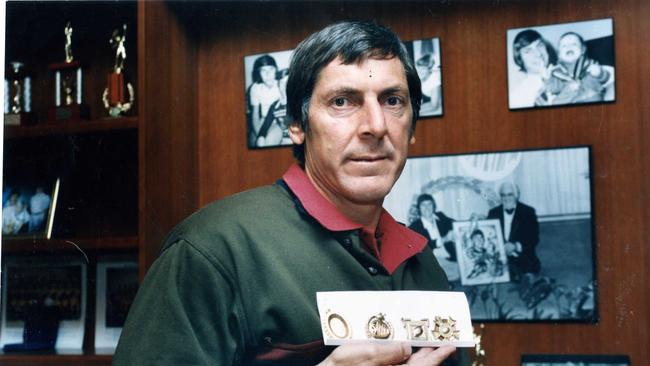
Ebert’s son, Brett, played 166 games for the Power and followed in his footsteps by winning a Magarey, in 2003, while nephew, Brad, featured in 260 AFL games for Port Adelaide and West Coast.
Port Adelaide great John Cahill, who coached Ebert, called him a once-in-a-generation champion.
“We all respect his wonderful sporting achievements, but as a husband father, grandfather, brother he truly shone,” Cahill tweeted.
“From the Cahill family our sincere condolences to the Ebert family.”
Port Adelaide chairman David Koch said Ebert stood tall among the many club greats.
“While all of the champions and legends played for Port Adelaide, Russell lived Port Adelaide,” Koch said.
Ginever said Ebert’s legacy would continue “through the community, the footy club, his family and people like me who love telling stories about him”.
Ebert is survived by his wife, Di, and children Ben, Brett and Tammie.
Originally published as Russell Ebert state funeral: Port Adelaide legend to be honoured at Alberton Oval on Tuesday


